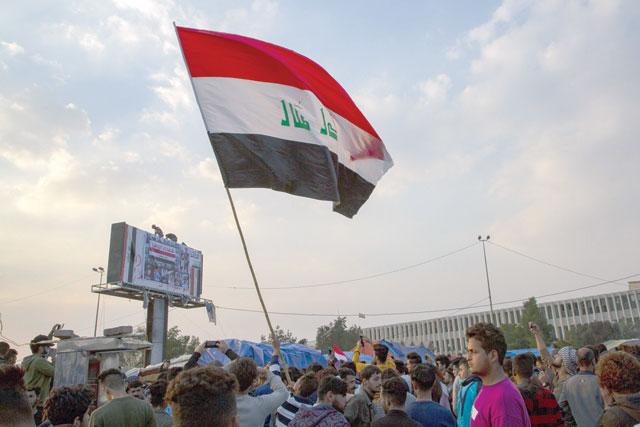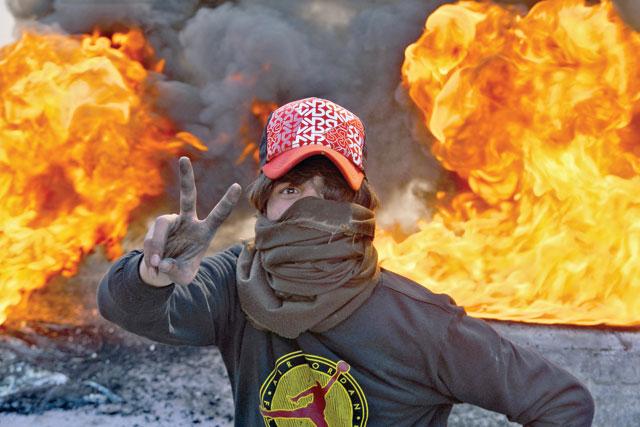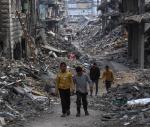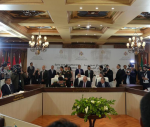You are here
Iraqi protesters keep up rallies despite pressure from police
By AFP - Jan 27,2020 - Last updated at Jan 27,2020
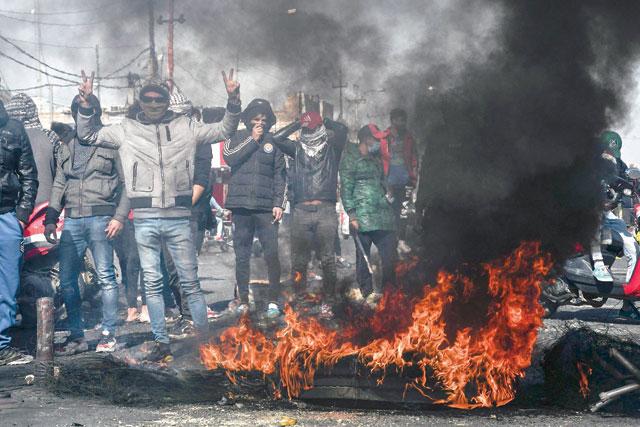
Masked anti-government protesters flash the victory gesture behind flaming tyres at a make-shift roadblock during a demonstration in the city of Nasiriyah in Iraq's southern Dhi Qar province on Sunday (AFP photo)
BAGHDAD — Iraqi security forces shot live rounds to clear protests in Baghdad and the south for a second day on Sunday, but thousands of determined students flooded the streets to keep up their movement.
Violence has resurged in the capital and Shiite-majority south this week, with more than 15 people killed as anti-government activists ramped up their road closures and sit-ins while security forces sought to snuff out the campaign.
On Saturday, four demonstrators were shot dead as riot police stormed protest camps across the country, according to medics, stoking fears of a broader crackdown.
But thousands of students rallied on Sunday, waving Iraqi flags and holding up two fingers in a victory sign.
“Only for you, Iraq!” read a sign held by a young protester in the shrine city of Karbala, hinting at the movement’s insistence on not being affiliated with any political party or outside backer.
In Basra, hundreds of students gathered to condemn the riot police’s dismantling of their main protest camp the previous day, according to an AFP correspondent.
They also led the way in Kut, erecting new tents to replace those taken down the previous day, and in Najaf, blocking off main roads with burning tyres.
In Baghdad, university students marched from a campus in the city centre to the main rally area of Tahrir Square.
Riot police fired live rounds and tear gas at clusters of young protesters in the nearby Khallani and Wathba squares, but protesters threw rocks and Molotov cocktails to keep them back.
At least 17 protesters were wounded, a police source said.
Security forces have stopped short of entering Tahrir Square itself, where many tents have been dismantled but remaining protesters have pledged to stand their ground.
UN urges action
In the southern city of Nasiriyah, security forces Sunday also fired live rounds to disperse protesters who were angered by authorities pushing them out of roads around their main protest camp in Habbubi Square.
At least 75 protesters suffered bullet wounds and around 100 were impacted by tear gas in brief skirmishes, a medical source told AFP.
The youth-dominated protests erupted on October 1 in outrage over lack of jobs, poor services and rampant corruption.
They spiralled into outraged calls for a government overhaul after they were met with violence.
Protesters are now specifically demanding snap elections, the appointment of an independent premier and the prosecution of anyone implicated in corruption or recent bloodshed.
Parliament has passed a new electoral law and Prime Minister Adel Abdel Mahdi submitted his resignation in December, but he still serves in a caretaker role and authorities have otherwise failed to act on the protesters’ demands.
“Unaccountability and indecisiveness are unworthy of Iraqi hopes, courageously expressed for four months now,” the United Nations’ top Iraq official, Jeanine Hennis-Plasschaert, said on Saturday.
“While death and injury tolls continue to rise, steps taken so far will remain hollow if not completed.”
Sadr drops support
Activists have long worried that their movement could be snuffed out after firebrand cleric Moqtada Sadr dropped his support on Friday.
The notoriously fickle militia leader-turned-politician backed the protests when they first started and called on the government to resign — even though he controls the largest bloc in parliament and top ministerial posts.
Sadr’s supporters had widely been recognised as the best-organised and well-stocked protesters in Tahrir Square.
But after holding an anti-US rally in Baghdad on Friday that was attended by thousands, Sadr said he no longer wanted to be involved in the separate regime change movement.
Within hours, his supporters were dismantling their tents in protest camps across the country and riot police began moving in.
Analysts said Sadr was striving to both maintain his street credibility and win favour with Iraq’s powerful neighbour Iran.
Sadr has complex ties with Tehran. He is completing advanced religious studies in the Iranian holy city of Qom, but has often worked against Iranian-backed parties in Iraqi politics.
Iran holds tremendous political and military sway in Iraq and will likely have a major say in who Abdel Mahdi’s replacement will be.
Talks over the next premier remain deadlocked in the absence of two key brokers — Iranian general Qassem Soleimani and Iraqi military powerhouse Abu Mahdi Al Muhandis.
Both were killed in a US drone strike on Baghdad on January 3, which outraged Iraq and fuelled calls for the 5,200 US troops deployed there to leave.
Related Articles
BAGHDAD — Three protesters were shot dead in Iraq on Saturday in clashes with security forces clearing out streets and squares occupied for
BAGHDAD — Iraq's president named former communications minister Mohammad Allawi as the country's new prime minister on Saturday after an 11t
BAGHDAD — Anti-government demonstrators rebuilt torched protest camps across Iraq on Monday, seeking to keep up their movement's momentum af



